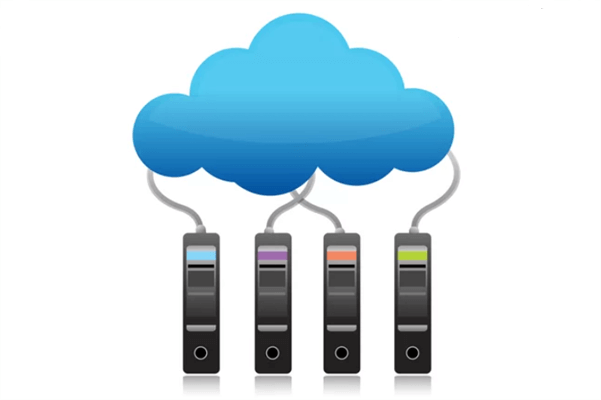When considering data storage options, the debate of external hard drive or cloud backup often arises. This comparison helps you understand the benefits of each approach. Explore factors like cost, accessibility, and security to make the best choice for your data needs!

Quick Search:

Having a cloud backup is similar to having a virtual file safety net. On the internet, you upload your data rather than keeping it on a physical device. Your data are always available as long as you have internet access thanks to services like Google Drive, Dropbox, and iCloud. Isn't it incredibly handy? Suppose you are out and about and you need a picture or a document. You only need to click a few buttons on your phone to access cloud backup!
>>Learn 6 best free cloud backup services.
So, why should you consider going the cloud route? Here are a few standout benefits:
- Accessibility: Access your files from anywhere. Need that presentation on the go? No problem!
- Automatic Backups: Many services automatically back up your data. Set it and forget it!
- Space-Saving: No need to clutter your desk with devices; your data lives in the cloud.
However, it’s not all sunshine and rainbows. Here are some drawbacks to consider:
- Internet Dependency: No internet? No access to your files. It’s like having a library that closes after hours.
- Ongoing Costs: While some services offer free space, premium options can get pricey. Think of it as a subscription to your favorite magazine—great content, but you’ve got to pay for it!

Now let’s shift gears and talk about external hard drives. These are physical devices that you connect to your computer. They store your files like a big USB stick but with much more space. Imagine having a giant filing cabinet that you can carry around!
What makes external hard drives a solid choice? Here’s the scoop:
- Large Storage Capacity: You can store massive amounts of data. Think of it as your personal vault!
- Speed: Transferring files can be faster than uploading to the cloud, especially with large files. It’s like a speedy highway versus a winding back road.
- One-Time Purchase: No subscription fees! You buy it once and own it forever, which can feel pretty liberating.
But before you rush out to buy one, let’s talk about some downsides:
- Portability Issues: While they are portable, you can still lose or damage them. They’re not as easily accessible as files in the cloud.
- Physical Damage: If you drop it or it gets wet, your data could be gone in an instant. It’s like having a fragile vase that looks nice but can break easily.
Do you want to transfer photos from Mac to external hard drives?
Now that we've laid the groundwork, let’s compare these two options directly. Which one should you choose?
When it comes to cost, cloud services often have tiered pricing. Some offer free plans, but premium plans can add up over time. External hard drives, on the other hand, are a one-time expense. Think of cloud backup as a subscription service and external drives as a one-time purchase that you’ll have for years.
Cloud backup wins here. With just an internet connection, you can access your files from anywhere. An external hard drive is only accessible when you have it with you, which can be a hassle if you forget it at home!
Security is vital, and both options offer different advantages. Cloud services often provide encryption and are less likely to be lost or stolen. However, if someone gets their hands on your external hard drive, they could access your data easily. It’s like having a safe that you can either keep in a secure location or carry around—both have their risks.
Cloud backup typically wins for ease of use. Most services have user-friendly interfaces and automatic backups. External hard drives require you to manage backups manually. It’s like having a smart assistant versus doing everything yourself.
When it comes to transferring large files, external hard drives usually take the crown. However, if you have a strong internet connection, cloud backups can still be quite speedy. It’s all about finding that balance between convenience and performance.
So, which one should you choose? It depends on your needs! If you’re always on the go and want easy access to files, cloud backup is the way to go. But if you’re looking for large storage and one-time costs, an external hard drive might suit you better. Think about your lifestyle and how you use your data to make the best choice!
The argument between external hard drives and cloud backup ultimately comes down to personal preference and your unique requirements. Take into account aspects like cost, security, and accessibility as each alternative has advantages and disadvantages. Whatever you decide, the most important thing is to make sure your data is secure!
Managing data across many cloud storage systems has grown in popularity in today's digital environment. "Can I use multiple cloud backup accounts at the same time?" is a question that many people have. The answer is definitely yes! In addition to increasing your storage capacity, using several accounts gives your crucial files an extra degree of protection and redundancy. But switching between platforms might be difficult—that's where MultCloud comes in.
By enabling you to connect and manage numerous cloud accounts from a single, handy interface, our robust cloud management tool simplifies the procedure. Without having to switch between apps, MultCloud makes it simple to sync data, move files between cloud services, and even backup your information across platforms.
Whether you’re looking to consolidate cloud storage or simply enhance your backup strategy, MultCloud is here to simplify your cloud experience.